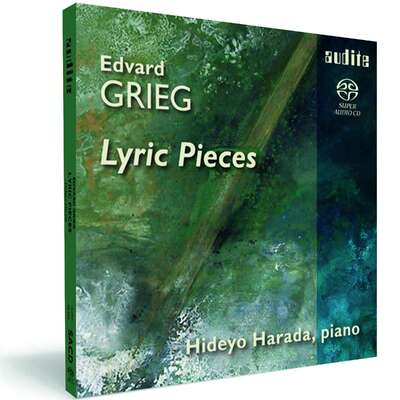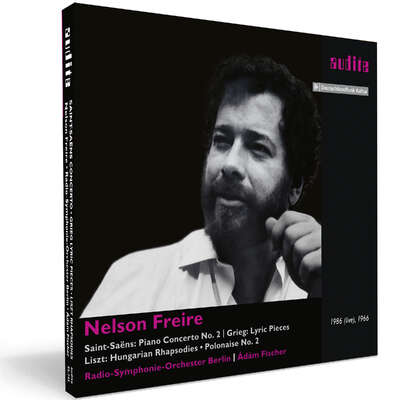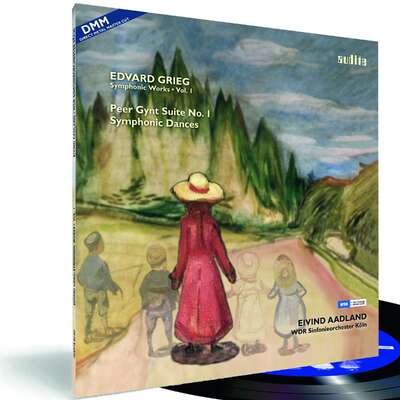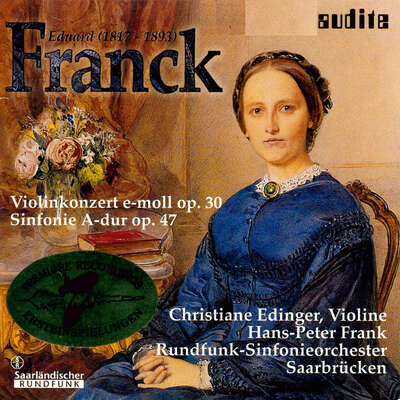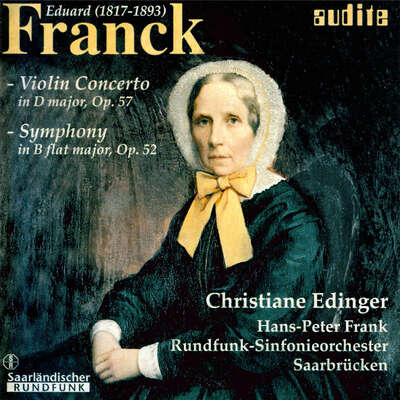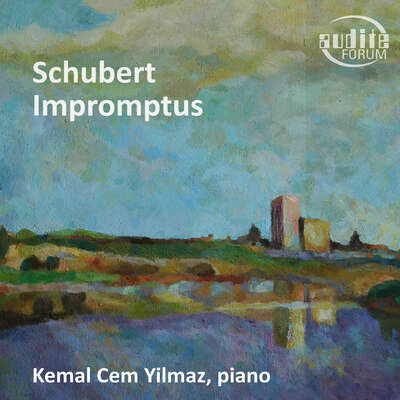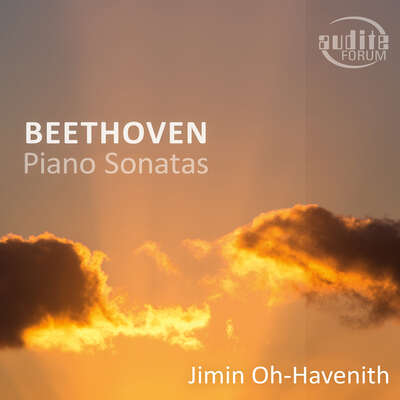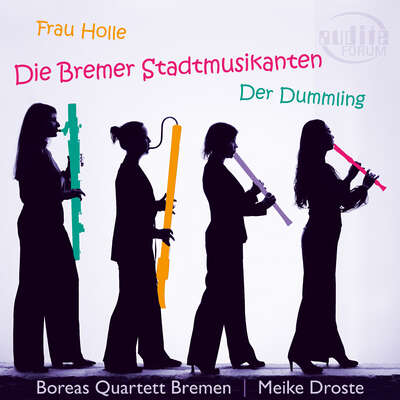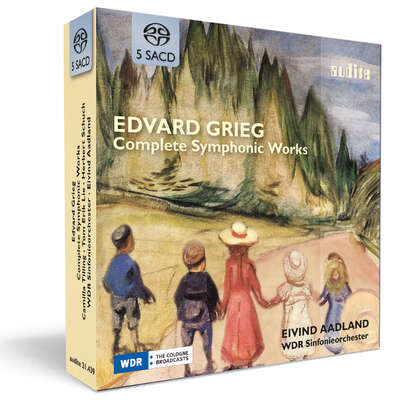
Edvard Griegs populärstes Werk vereint mit seinem unbekanntesten: Während das Klavierkonzert a-Moll den Durchbruch des 25-jährigen zum Weltruhm bedeutete, hat er seine wenige Jahre zuvor komponierte Sinfonie selbst wieder zurückgezogen. Dennoch überzeugt jede Seite der Partitur - trotz der offenkundigen Einflüsse von Schumann, Gade und auch Mendelssohn - durch Griegs jugendliche Inspiration und seinen grandiosen Erfindungsreichtum.mehr
"Mit seiner Eigenschaft der nicht nur brillierenden, technischen Sicht auf diese Musik weiß Schuch dieses Konzert eindringlich zu gestalten, mit Lyrismus, mit Vehemenz, mit famoser Agogik und Phrasierung. Und er bildet mit dem Orchester eine derartig grandiose Einheit, dass man sich kaum erinnert, dieses Konzert jemals besser gehört zu haben . Eine Referenzeinspielung!" (Piano News)
Details
| Edvard Grieg: Complete Symphonic Works, Vol. IV | |
| Artikelnummer: | 92.670 |
|---|---|
| EAN-Code: | 4022143926708 |
| Preisgruppe: | ACX |
| Veröffentlichungsdatum: | 19. September 2014 |
| Spielzeit: | 62 min. |
Zusatzmaterial
Informationen
Die vierte Folge der Gesamtaufnahme aller Orchesterwerke von Edvard Grieg mit dem WDR Sinfonieorchester Köln und dem Dirigenten Eivind Aadland vereint das populärste Werk des norwegischen Nationalkomponisten mit seinem unbekanntesten: Das Klavierkonzert a-Moll, hier eingespielt von Herbert Schuch, bedeutete den internationalen Durchbruch des 25-jährigen Grieg zum Weltruhm und gehört zu der Handvoll großer Klavierkonzerte, an denen sich jeder Pianist messen lassen muss. Das große Vorbild Schumann (immerhin hatte auch Grieg in Leipzig studiert) wird im Konzert mit norwegischer Volksmusik verbunden - zum ersten Mal findet sich in einem Werk von Grieg dieser nationale Einfluss, der nicht nur die Landsleute, sondern auch das europäische Musikpublikum begeisterte. Dagegen findet sich in der 1864 vollendeten Sinfonie kaum ein norwegischer Tonfall: Grieg eiferte hier neben Schumann dem dänischen Sinfoniker Niels Wilhelm Gade nach, der dem jungen Kollegen dringend zu der Gattung riet. Obwohl eine beachtliche Talentprobe des 21-jährigen, war Grieg mit seiner Sinfonie nicht ganz zufrieden und verbot jede weitere Aufführung. Erst 1980 wurde das Werk unter abenteuerlichen Umständen in der Sowjetunion wiederaufgeführt und sofort als wichtiger Markstein der skandinavischen Orchesterkultur des 19. Jahrhunderts erkannt. Trotz der offenkundigen Einflüsse von Schumann, Gade und auch Mendelssohn überzeugt jede Seite der Partitur durch Griegs jugendliche Inspiration und seinen grandiosen Erfindungsreichtum.
Besprechungen
ionarts.blogspot.com | Tuesday, August 30, 2016 | Jens F. Laurson | 30. August 2016 | Quelle: http://ionarts.b... Dip your ears
[…] It’s almost eerily similar to another recent (also live) recording that combines the concerto with Lyric Pieces (although four of Ott’sMehr lesen
In the Lyric Pieces Ott (and the acoustic) is a little drier, a little leaner, while Perianes indulges in a freer rubato. Incidentally that’s closer to Grieg, whose rubato was very free-wheeling, indeed. Another fine, slightly specialist release, of Grieg’s Piano Concerto and select Lyric Pieces (played on Grieg’s piano and trying to emulate Grieg’s own performances) shows this to be the case, namely that of Sigurd Slåttebrekk with the Oslo Philharmonic under Michail Jurowski on Simax (ionarts review here: Musical Journey Through Norway). Alice Sara Ott navigates her way through these pieces in similar manner as with the concerto. She won’t indulge, and while her butterfly is fast and sufficiently nervous, she doesn’t deliberately undercut the romantic cliché, either. Like that butterfly, the pieces flit by with great pleasantness and slight blandness.
If that sounds like a gentle bashing, it’s not intended that way. These qualities are no detriment to the music or recording. Actually, this disc could be considered an ideal Griegtroduction™: it does not overly color the canvas of the music and leaves the ears ready, thereafter, to open-mindedly receiving and considering any number of differing interpretations. The only snag: There is one similar recording already, which does all that, a little more of it, arguably a little more interestingly while doing it, and certainly no worse at it. That’s Leif Ove Andsnes’ first, super-stormy, recording of the concerto with the Bergen Philharmonic under Dmitri Kitayenko which, in a coupling on a Virgin twofer (now Erato, if only Warner only re-issued it at last, hopefully with the same Delacroix’ “Orphan girl seated in cemetery” on the cover), added many more lyric pieces and the Piano Sonata on two discs priced lower than the DG release. […]
The New Listener | 09/04/2016 | Oliver Fraenzke | 9. April 2016 Perlen des Nordens
Eivind Aadland geht dem Orchesterwerk dieses grandiosen Komponisten auf den Grund, gemeinsam mit dem WDR-Sinfonieorchester Köln spielte er es auf fünf CDs für audite ein. Das Orchester spielt klar und durchhörbar, der Dirigent verzichtet auf alle unnötigen Romantizismen und überdehnte Tempi rubati. [...] Es entstehen vielfarbige Schattierungen und das Ganze wird nicht wie viel zu häufig zu hören in einem einzigen monochromen „Grieg-Klang“ verschmolzen.Mehr lesen
WDR 3 | 01.03.2016 | 1. März 2016 | Quelle: http://www1.wdr.... BROADCAST
Sendebeleg siehe PDF!Mehr lesen
www.opusklassiek.nl | januari 2016 | Aart van der Wal | 1. Januar 2016
Het is duidelijk, Aadland en het orkest hebben dit repertoire zo goed in de vingers, er zoveel affiniteit mee dat dit project alleen daarom al als ijzersterk mag worden gekwalificeerd Daar komt dan nog bij dat het orkestspel van hoog gehalte is en dat de in de Keulse Philharmonie en de Bismarck-zaal gemaakte opnamen tot de beste mogen worden gerekend die ik tot nu toe uit die bron heb gehoord.Mehr lesen
www.limelightmagazine.com.au | June 2015 | Greg Kune | 1. Juni 2015 A warhorse gets a good trot alongside a forgotten pony
I've raved about Eivind Aadland's recordings with the excellent West Deutsche Rundfunk Orchestra in his Grieg cycle and this vivid performance and lovely recording maintain the standard. [...] One review exclaimed "his shadings have shadings" - exactly! His tone is gorgeous and so is this CD.Mehr lesen
American Record Guide | 31.03.2015 | Paul L Althouse | 31. März 2015
Over his entire career Grieg wrote only two orchestral works in the traditional multimovement format: this symphony and concerto. Both are earlyMehr lesen
The symphony performance under Eivind Aadland has everything you would hope for: lots of energy and excitement, with a very fine, well-prepared orchestra. The music emerges with a sense of youth and enthusiasm, and rhythms are crisp. With the concerto, of course, we are on familiar ground. The catalog lists dozens of fine recordings, and a relative newcomer like Schuch (now in his mid-30s) won’t gain notice easily. But this is a fine performance. He throws himself into the piece with lots of excitement in the outer movements and plenty of virtuosic display, mainly in the big cadenza. He also gives us ample poetry in the slow movement and the finale (before the strange stop in the middle!) Schuch is ably backed by Aadland, who brings the same level of excitement here as in the symphony.
This is Volume IV of Audite’s complete edition of Grieg’s orchestral work in five volumes (see our index). It comes with fine, detailed notes, and the sound is first rate. A fine job all around!
Fanfare | 26.03.2015 | Jim Svejda | 26. März 2015
For the fourth (and next-to-last) installment of its stunning series of the complete symphonic works of Edvard Grieg, Audite made the canny decisionMehr lesen
Composed for Copenhagen at the suggestion of Niels Gade when Grieg was only 20, the Symphony in C Minor is an amiable, well-made stylistic hodge-podge that mixes Schumann, Mendelssohn and—for those with a very discerning ear—Gade himself. Finished in 1864, the symphony was not performed until 1980, when it was finally heard against the composer’s wishes and instructions. The premiere was given—wouldn’t you know it—in the Soviet Union, by the Russian conductor Vitali Katayev, who asked the Bergen city library for a photocopy for “research purposes only” and then performed it anyway. (One more reason not to lament the passing of The Evil Empire.)
The brilliant young Norwegian conductor Eivind Aadland treats the piece like the early work it is, wisely choosing never to overstate the case or try to turn it into the youthful masterpiece it clearly isn’t. Still, everything is done with such loving care and meticulous attention to detail—listen especially to the incredibly refined and sensitive phrasing in the lovely Adagio espressivo—that it’s difficult to imagine a stronger case ever being made for the piece.
The version of the piano concerto is as fresh-minted and spontaneous sounding as everything else in the series, with the WDR Symphony again playing in a way that suggests it’s coming to the music for the very first time (in the best possible sense). The Romanian-born Herbert Schuch is a probing and imaginative soloist, often acting like the first among equals in a fine chamber music recital. The playing itself is lithe and endearingly capricious, especially in the concerto’s cadenza, which for once sounds like cadenzas were meant to sound: as though someone were making it up on the spot. There’s also plenty of fire and muscle when the music requires it, most notably in a finale which steps off at a pace that manages to seem both cracking and completely comfortable. Again, the orchestra performs countless little expressive miracles along the way. Try sampling the flute solo about two and a half minutes in: You can actually smell the chilly morning air.
As in the previous installments in the series, the recorded sound is as warm and natural as the performances themselves. Alas, the concluding Volume Five must now be anticipated with equal amounts of eagerness and regret: as in, what a pity Grieg didn’t write more things for this bunch to record.
Scherzo | Número 305 - Marzo de 2015 | Juan Carlos Moreno | 1. März 2015
Mejor, como siempre, Eivind Aadland, quien vuelve a demostrar su empatía con Grieg en este poco agradecido programa.Mehr lesen
Record Geijutsu | 2015.2 | 1. Februar 2015
japanische Rezension siehe PDF!Mehr lesen
Image Hifi | 2/2015 | Heinz Gelking | 1. Februar 2015 Hörenswertes
In Köln entstand keine stürmische, sondern eine eher frische und kraftvolle, am Klavier brillant gespielte und trotzdem nicht vom Solisten dominierte, sondern auch durch ein prägnantes und transparentes Orchesterspiel getragene Version. [...] Lange habe ich keine Aufnahme mit Klavier plus Orchester gehört, in der Parameter wie Transparenz, Energie und Raum so gut unter Dach und Fach gebracht wurden.Mehr lesen
Das Orchester | 02/2015 | Susanne Rudolph | 1. Februar 2015 | Quelle: http://www.dasor...
Da der norwegische Dirigent Eivind Aadland mit dem WDR Sinfonieorchester all diese Attribute mit liebevoller Detailgenauigkeit und sprühendem Elan ausspielt und weder kernige Klangwucht noch Empfindungstiefe scheut, dürfte es dem Zuhörer ähnlich gehen wie einst Rubinstein und Bernstein: Je öfter er die Sinfonie anhört, desto lieber wird sie ihm… Kurz: Diese bemerkenswerte Talentprobe des jungen Edvard Grieg, in der sein typisch nordisches Idiom schon aufscheint, ist eine bereichernde Entdeckung.Mehr lesen
Vårt Land
| Tirsdag 13. Januar 2015 | Olav Egil | 13. Januar 2015
Grieg med dyp pust
Blant uendeligheten av innspilte Grieg-toner føyer de nyeste seg inn blant dem som tar det store overblikket - uten tusser, tuer og norske kratt
Det er en forrykende tolkning. Aadlands utgave er, som alt i denne serien, preget av moden vurdering og sikker sans for at musikken bærer, om den bare får tid til å puste og ikke piskes opp. I Aadland hånd – opplever jeg – blir Griegs Symfoni for første gang virkelig interessant. Naturlig virtuositet (ved behov) avløses av klassisk, symfonisk refleksjon, kall det gjerne alvor, en lys form for alvor.Mehr lesen
hifi & records | 1/2015 | Uwe Steiner | 1. Januar 2015
Wie schon in den vorangegangenen drei Folgen seiner Einspielung sämtlicher Orchesterwerke Griegs macht Eivind Aadland auch diese Musik so stark wie irgend möglich, vor allem gönnt er ihrem poetischen Zauber die erforderliche Transparenz und die Vielfalt der Orchesterfarben. Auf vordergründige Effekte verzichtet zumal die Wiedergabe des Klavierkonzerts. Herbert Schuch musiziert ganz auf dieser Linie, indem er bei tadelloser Technik, niemals vordergründig den Virtuosen ausstellt, um stattdessen vielmehr die Schönheiten dieser Partitur lyrisch und sanglich zu entfalten. Eine Empfehlung!Mehr lesen
Diapason | N° 631 Janvier 2015 | Nicolas Derny | 1. Januar 2015
«Rentre chez toi et écris une symphonie», conseille Niels Gade au jeune Grieg, qui s'était alors frotté qu'aux petites formes. L'apprentiMehr lesen
Depuis la levée de l'interdiction en... 1981 par la bibliothèque qui la détenait, les gravures ne manquent pas. La nouvelle, bien ancrée sur son large socle (mais pas empesée pour autant), doit beaucoup au geste nerveux d'Eivind Aadland. On peut rêver, dans l'ondoyant Adagio espressivo, de couleurs plus «boréales» que celle de l'orchestre de Cologne, mais l'élan populaire que le chef confère au scherzo et l'énergie trépidante du finale enthousiasment plus que de coutume. Un joli coup de frais.
Soliste et maestro travaillent ensuite à caractériser au mieux les différents épisodes du concerto pour piano. De la vigueur parfois un peu dure au lyrisme le plus chantant, Herbert Schuch montre l'étendue de sa palette expressive et veille à l'élégance du rubato. En outre, les compères semblent prendre un malin plaisir à accentuer ici l'influence de Chopin, à tirer là des fusées lisztiennes, ou à annoncer Rachmaninov. Personnel, bel et bon, mais trop contrôlé. Un peu d'abandon n'aurait pas nui.
Piano News | Januar/Februar (I/2015) | Carsten Dürer | 1. Januar 2015
Mit seiner Eigenschaft der nicht nur brillierenden, technischen Sicht auf diese Musik weiß Schuch dieses Konzert eindringlich zu gestalten, mit Lyrismus, mit Vehemenz, mit famoser Agogik und Phrasierung. Und er bildet mit dem Orchester eine derartig grandiose Einheit, dass man sich kaum erinnert, dieses Konzert jemals besser gehört zu haben . Eine Referenzeinspielung!Mehr lesen
Classical CD Choice | December 13, 2014 | Barry Forshaw | 13. Dezember 2014 | Quelle: http://www.cdcho...
[...] the concerto is given a reading of great spirit and colour.Mehr lesen
Der Tagesspiegel | 07.12.2014 | Frederik Hanssen | 7. Dezember 2014
Stille Nacht? Von wegen!
Tagesspiegel-Kritikerinnen und -Kritiker empfehlen: Die besten CDs zu Weihnachten
[...] leidenschaftliche Musik, handwerklich tadellos gearbeitet und genuin romantisch.Mehr lesen
Gramophone | December 2014 | Rob Cowan | 1. Dezember 2014
'Must never be performed' is an obvious red rag to any musical bull and although Grieg's youthful C minor Symphony reveals numerous influences, someMehr lesen
A good idea to couple Grieg's least familiar orchestral work with its totally familiar near contemporary, the A minor Piano Concerto, in a not insubstantial reading by the excellent Herbert Schuch, who sounds-as if he's worked over every semiquaver with infinite care. Not that the performance lacks spontaneity, more that inner voices, crisp rhythms and a sculpted brand of poetry suggest a truly 'settled' interpretation, one that happily compares with (but hardly replaces) the best available. Again Aadland and his Cologne players provide an excellent account of the orchestral score, supportive of Schuch and distinctive on its own terms, and the recorded balance is excellent.
International Record Review | December 2014 | Colin Anderson | 1. Dezember 2014
Edvard Grieg would prefer that we did not know his Symphony in C minor. But his cover was broken in the late days of the LP when Decca issued aMehr lesen
There is something of a chivalrous fee l to the first movement. If the slow one is a relative disappointment, it's because the very opening is quite lovely but then the music doesn't quite bloom as the initial promise suggests it might. It's tenderly played here, though, as part of a sympathetic and well-prepared reading that continues with a robust, dancing scherzo, itself contrasted with a pastoral trio. The finale drives along with a sense of purpose and direction and also with a sense of emotional urgency, and lightly trips, too, in a very attractive way. The cited stylistic likenesses that are made in Audite's annotation to composers such as Niels Gade, Mendelssohn and Schumann are justified, if applicable more to the former than the two Germans. Yet, ultimately, Grieg is characteristically Grieg in this work, not quite fully formed, doubting himself, but Ieaving us a work that can be much enjoyed.
The excellent music-making and recorded sound is carried into a piece at the polar extreme of Grieg's popularity, the Piano Concerto. Eric Morecambe may have made hay with it more than 40 years ago, with André Previn his willing and brilliant accomplice. Herbert Schuch, with the full support of the orchestra and conductor, gives a fresh and flowing, feisty even, account of music easy to take for granted. There is much that is gentle and tender, too, and the slow movement is especially soulful, beautifully brought off, and the finale has an invigorating impetuousness as well as idyllic romance and final triumph. Throughout, a positive collaboration informs this honest outing for such a familiar concerto. (The earlier volumes in this series were reviewed in July / August 2011 and September 2013).
Infodad.com | November 13, 2014 | 13. November 2014 The extent of the symphony
His Piano Concerto, however, is of crucial importance, and it shares the SACD with the symphony and gets a grand, sweeping and altogether winning performance from Herbert Schuch.Mehr lesen
Mitteldeutscher Rundfunk | MDR FIGARO | Take 5 | 03.11.2014 | 18:05-19:00 Uhr | Andre Sittner | 3. November 2014 | Quelle: http://www.mdr.d... BROADCAST CD-Empfehlung
Alles in allem also sehr gelungen und eine würdige Fortsetzung der zu Recht vielgelobten Grieg-Reihe bei Audite.Mehr lesen
Muzyka21 | listopad 2014 | Stanisław Lubliński | 1. November 2014
Płyta urzekła mnie po pierwszych dźwiękach. Poziom orkiestry jest znakomity pod względem sprawności technicznej i precyzji, nienagannej intonacji, spójności barwowej i elegancji odpowiedniej dla muzyki Norwega. [...] Herberta Schucha prawdziwym mistrzem klawiatury. Jego niezwykła elastyczności w podejściu do koncertu Griega zachwyca.Mehr lesen
BBC Music Magazine | November 2014 | MSR | 1. November 2014
Grieg's most popular piece alongside his most forgotten, the amlable Symphony he withdrew soon after it was written. The Concerto performance lacksMehr lesen
Musik & Theater | 11/12 November/Dezember 2014 | Reinmar Wagner | 1. November 2014 Verbotene Sinfonie
Beschwingt, akzentuiert klingt das, mit Elan und einer Portion eher jugendlichem als romantischem Pathos, Herbert Schuch ist der tadellose Solist im Klavierkonzert.Mehr lesen
www.pizzicato.lu | 29/10/2014 | Remy Franck | 29. Oktober 2014 Lebendige Grieg-Interpretationen
In seiner Gesamtaufnahme von Edward Griegs symphonischem Werk kommt Eivind Aadland nicht an der viel und nicht zuletzt vom Komponisten selberMehr lesen
Im Klavierkonzert geht der Dirigent recht sachlich mit der Musik um und arbeitet zusammen mit Herbert Schuch ein Maximum an Nuancen und Kontrasten im Grieg-Konzert heraus. Das führt zu einer lebendigen Darstellung, in der kraftvolle Bravour und poetische Lyrik mit klarem Kopf platziert und dosiert werden.
Lively and stylish performances in a very natural sound. However, even in such a good interpretation, Grieg’s Symphony remains a rather uncharacteristic and unsatisfying work.
http://theclassicalreviewer.blogspot.de | Sunday, 19 October 2014 | Bruce Reader | 19. Oktober 2014 Audite’s fourth volume in their edition of The Complete Symphonic Works of Edvard Grieg is another fine release that leaves this series set to become a real winner
Altogether this is another fine addition to Audite’s ongoing complete symphonic cycle. The recording from Köln Philharmonie is excellent and there are informative booklet notes. This series is set to become a real winner.Mehr lesen
Bayerischer Rundfunk | BR-Klassik, CD-Tipp vom 06.10.2014 | 6. Oktober 2014
BROADCAST
CD-TIPP
Sendebeleg siehe PDF!Mehr lesen
Klassisk Musikkmagasin | Nummer 4/2014 | Martin Anderson | 1. Oktober 2014
Schuch’s very first entry is made with such precision and power that you sit up in surprise – you know that something special is ahead of you, and so it proves, in one of the best accounts of this constantly recycled concerto that I’ve heard. [...]Mehr lesen
Neue Musikzeitung | 10/14 Oktober 2014 | Hanspeter Krellmann | 1. Oktober 2014 Unüberhörbar
[...] vier zur Serie gebundenen CDs in einer durchgehend resolut angegangenen wie sensibel nachempfundenen Darstellung.Mehr lesen





































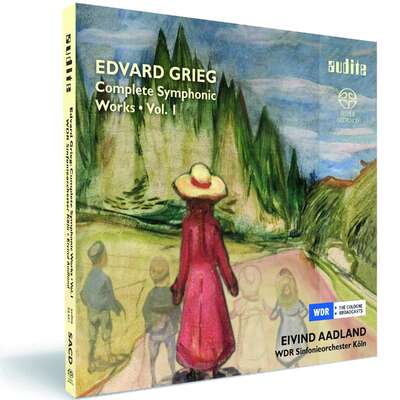
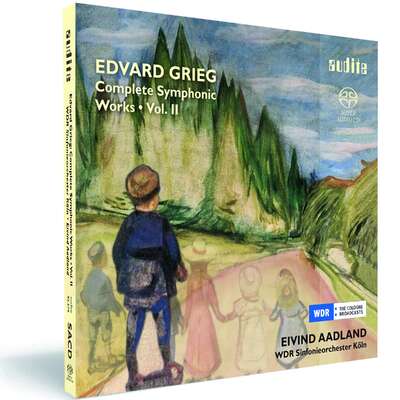
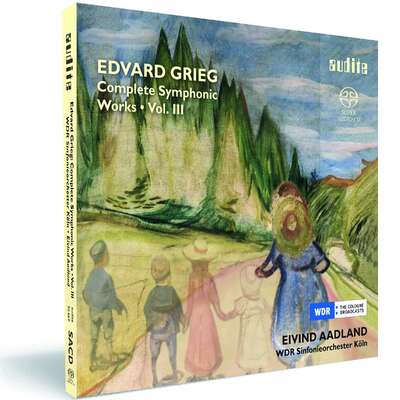
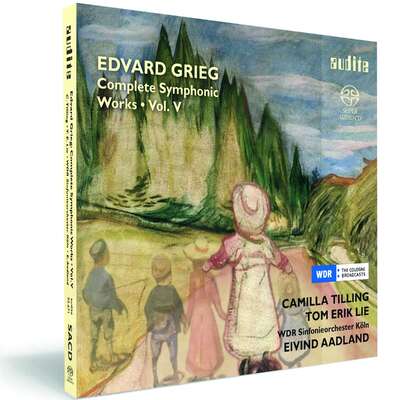
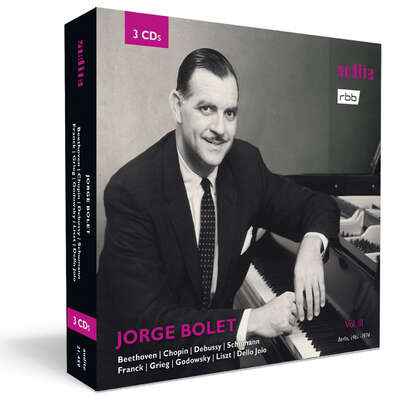
![23446 - k[NOW]n Piano](/image/product/3d/carousel/23446-known_piano.jpg)
